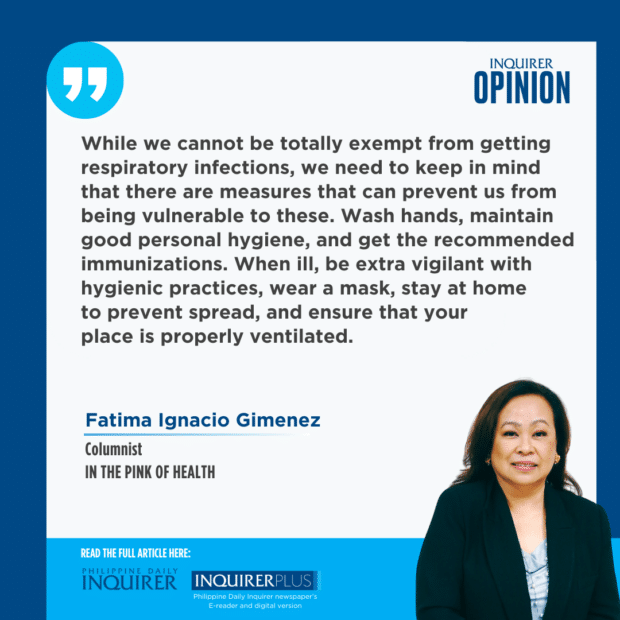What’s at stake

You are not alone.
I am sure that in the past months, you, a family, a household member, or a co-worker have experienced a respiratory infection. While the immunocompetent ones are more likely to have recovered quickly, those that are vulnerable, such as individuals with co-morbid conditions, chronic illnesses, on immunosuppressive drugs, the very young and the more advanced in years may not have been as fortunate, experienced a prolonged course of illness, required further intervention, was hospitalized, or in extreme cases succumbed to the disease.
In March of this year, the US Centers for Disease and Control issued updated guidelines on common respiratory viruses including COVID-19, the flu, and respiratory syncytial virus (RSV). These guidelines are meant for the general population and not for health-care institutions which have their individualized policies.
Locally, we have documented the occurrence, but not the exact incidence of respiratory viruses, by way of data gathered from hospitals where testing was done for individuals who sought consult and warranted further evaluation, were admitted, or screened before undergoing a procedure. The home test kits for COVID once widely available seem to be limited, most probably because the demand is less. Dismissed as a common cold, perhaps people do not feel the need to get tested as symptoms are usually mild.
Provided below are answers to the three most frequently asked questions.
What do I need to do if I am ill and symptomatic? At home, isolate and stay in a separate room. If this is not possible, always wear a mask, limit activities, and wash hands frequently. Ensure that your place has adequate ventilation. As to the length, the general recommendation is that you can go back to normal activities after you start feeling better and have been afebrile for more than 24 hours. Both requirements need to be present. This may take a few days, is not uniform for all, and is dependent on your immune status. It is also advised that for the next five days, one should take additional steps to ensure the virus is not spread to others, most especially to those who are at high risk. Maintain proper distance, always wear a mask, zealously adhere to personal hygienic measures, keep your work or home space properly ventilated, and get tested if needed. It is important to remember that while it is likely that you are less contagious, you are still a possible infectious source. Drink lots of fluids, get adequate sleep and rest. In the event that the fever does not abate in 48 to 72 hours, your cough or symptoms get worse, or you have difficulty breathing and have a notable decrease in appetite, seek immediate consult.
Is there a vaccine available? While there is none in the Philippines for COVID, we do have the flu vaccine and the recently introduced RSV vaccine for those 60 years old and above. For the flu vaccine, it is recommended to be given prior to the influenza season which, for the Philippines, is before the onset of rainy weather, beginning in June. In the US, you may also have heard of the RSV vaccine administered to mothers as a single dose from the 32nd to the 36th week of pregnancy, which enables earlier protection for the baby through the first few months of his life wherein he is most prone to getting severe disease.
Is there treatment? For flu, antivirals work best when given within one to two days after symptoms have started. Studies have shown that this decreases the risk of complications and shortens illness duration. It is recommended that those who are diagnosed or suspected to have flu and are at high risk, such as pregnant individuals, with heart diseases, diabetes, asthma, and chronic lung diseases be administered prompt treatment. For COVID, there are antiviral therapies that may be instituted based on the severity of the illness, age, and risk factors for the progression of complications. There is no treatment for RSV and management remains supportive. From the literature available, interventions such as the use of antiviral ribavirin, immune globulin, or monoclonal antibodies have been mentioned for severely immunocompromised patients.
While we cannot be totally exempt from getting respiratory infections, we need to keep in mind that there are measures that can prevent us from being vulnerable to these. Wash hands, maintain good personal hygiene, and get the recommended immunizations. When ill, be extra vigilant with hygienic practices, wear a mask, stay at home to prevent spread, and ensure that your place is properly ventilated. Have yourself tested to direct your next steps and do not delay consult if with progression of symptoms as treatment may be warranted.
Remember that our actions may affect another. Do a good deed and refrain from being a biological terrorist. We are all capable of saving lives.
—————-
timgim_67@yahoo.com





















